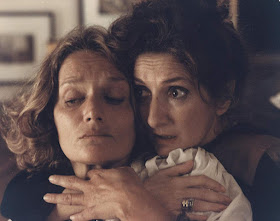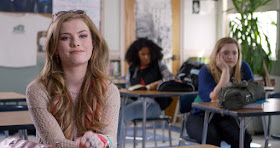Illustrating a change in the way he illustrates before working with clay, towards the end of writer/director Jacques Doillon's Rodin, the famous titular sculptor Auguste Rodin (played by Vincent Lindon) notes that he used to suggest poses for his models to take during sessions but he no longer makes that mistake.
Letting the two young, beautiful women that stand before him just organically move, bend, and rotate together, Rodin notes that he can't look down even for a second at what his hands have been drawing or else the connection between what he feels and what he sees will be broken.
A fascinating description of Rodin's creative process in a film overflowing with them, the delicate connection between life and art (and more often than not love and art) is a recurring theme of Doillon's Rodin which – much like their subject – struggles to find a balance between the two right from the start.
Opening in 1880, the film begins as forty-year-old Auguste Rodin earns his first state commission to sculpt "The Gates of Hell" based on Dante's "Divine Comedy." Yet despite having spent a year sketching his plans for such a massive undertaking, he prefers to rely on intellect and instinct, debating every point in a form of brainy foreplay with his student Camille Claudel (Izïa Higelin), the fiercely talented sculptor in her own right who would go onto become his lover, assistant, and muse.
And much like the way he confesses later on that he learned how to sculpt by watching clouds form, as a lover of movement who needs to feel what he sees – even with the foundation of his drawings – Rodin confesses that figures come to the most when he works with clay.
Trying to capture this feeling in the medium of film, Doillon and Coco Before Chanel cinematographer Christophe Beaucarne – who shot most of the film in the historic locations in which the events take place – rely on framing to emphasize Rodin's sensuous approach, vacillating between frenzied movement as Rodin chases his lovers to suddenly statuesque composition throughout.
Whether lounging on a bed before changing to another in a series of poses in quick succession or dangling her foot off the edge of a boat rowed by Rodin, the scenes with Claudel feel like living reflections of art we imagine he would've been eager to capture on the page, canvas, or clay.
Likewise depicting the imbalance of power that exists between the two – perhaps best epitomized by a gorgeous off-balance sculpture of her own entitled "The Waltz" – while in his letters Rodin frequently tells Claudel that he can't work without her, early on in their relationship we see her as dominating her older, more famous lover easily.
Escaping to England for months at a time, when she returns she pressures Rodin to make good on his promises to legitimize their relationship by signing a contract to make her his only student, introduce her to everyone, and marry her someday, which would force him to leave his decades-long partner, Rose (Séverine Caneele), his veritable housekeeper and trusted friend.
However, things change as the film goes on and we see how much the scales have tipped as she suffers by contrast. A brilliant artist ahead of her time, not only will the world never accept a nude sculpture made by a woman (even if most of the nudes are of and modeled by women), Claudel also discovers that they won’t accept one they believe was made in the Rodin style, despite the fact that they'd worked side-by-side and inspired one another for years.
And as the disappointments in her personal and professional life mount, it leads to the offscreen mental breakdown we've seen depicted over the years in other biopics – most famously by Isabelle Adjani in Bruno Nuytten's 1988 contemporary classic Camille Claudel.
Tired of seeing women used up and thrown away for the sake of an older man's career and reputation, especially when (unlike Lindon's far more benevolent and in fact almost feminist Rodin) the one played by Gerard Depardieu had been an arrogant ass, after I saw Nuytten's Claudel over fifteen years ago, it made me so angry that I had an immediate creative response.
Crafting a modern day gender flipped spin on the characters, Claudel became my own muse as well as I wrote my very first award-winning play, which understandably made me curious to see how I'd react to another telling of her life story in 2017.
However by switching the point of view to a surprisingly even-tempered Rodin and moving a majority of Claudel's downfall offscreen, this time from a feminist perspective you feel an even greater sadness for Rose who, just like the sculptress she resents, gets sidelined by love for an artist.
And while the main cast is excellent (especially Lindon who's been doing some of his best work over the past ten years in a variety of films including Mademoiselle Chambon and Welcome), Rodin's emphasis is less on its people than the art itself.
For as the film continues we realize that, aside from some scenes of domestic fireworks here and there, there's so much we don't know about them personally, which is evidenced by sudden lines of dialogue referencing characters and subplots that are never explored beyond that one moment of screen time.
Similar in spirit to the vastly superior La Belle Noiseuse, Rodin fascinates most when focusing on the creative process itself, including an outstanding sequence where – not wanting to see a pencil – Victor Hugo refuses to pose in a traditional way, necessitating Rodin to run back and forth in between rooms in order to capture Hugo's angles and features on paper before he forgets them.
With its ode to creativity culminating in a gorgeous coda as he helps stage a moonlight photo of his beloved masterpiece Balzac (which was never appreciated in his lifetime), Rodin walks a fine line between inspiring us with its detail and taking things much too far such as when it unnaturally tries to work in Monet, Cezanne, Rilke, and company into the film.
Stagey from the get-go given the way its characters wax poetically throughout by speaking in platitudes and quotable quotes, far too often it seems as if Doillon's extensive research and love for the period gets in the way of an organic plotline as Rodin plays as though he's trying to squeeze a four hour film like Noiseuse into a two hour one.
Considering the disconnect between life and art, in the end, it's a shame that the film didn't take a cue from its subject more often and – in place of too much detail from voice-overs to famous French figure cameos – just let things take shape naturally Rodin-style and form like clouds in the sky, a pencil on the page, or hands in clay.
Ultimately worth seeing since Rodin's passionate celebration of creativity outweighs the problems with its narrative reality, with its emphasis on framing and intriguing composition, perhaps its greatest takeaway is that it'll leave you looking at the world through an artist's eyes, at least for a little while.
Text ©2018, Film Intuition, LLC; All Rights Reserved. http://www.filmintuition.com Unauthorized Reproduction or Publication Elsewhere is Strictly Prohibited and in violation of the Digital Millennium Copyright Act. FTC Disclosure: Per standard professional practice, I may have received a review copy or screener link of this title in order to voluntarily decide to evaluate it for my readers, which had no impact whatsoever on whether or not it received a favorable or unfavorable critique. Cookies Notice: This site incorporates tools (including advertiser partners and widgets) that use cookies and may collect some personal information in order to display ads tailored to you etc. Please be advised that neither Film Intuition nor its site owner has any access to this data beyond general site statistics (geographical region etc.) as your privacy is our main concern.














































